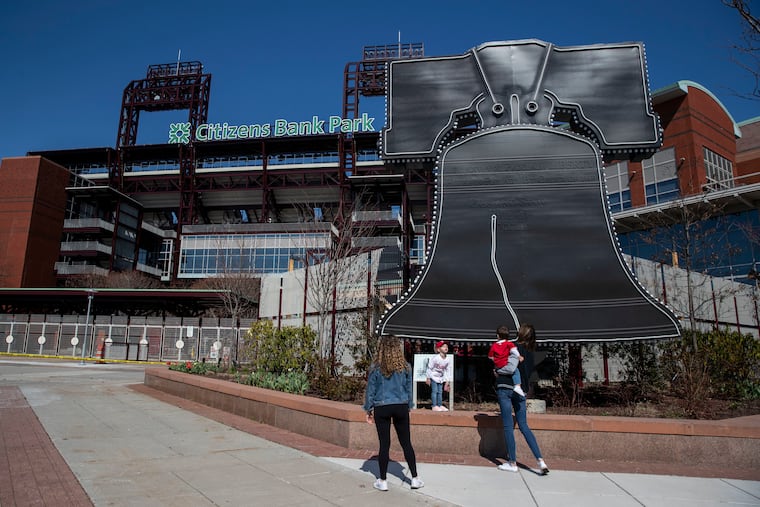MLB weighing multiple factors in brainstorming extreme scheduling scenarios amid coronavirus concerns
A recent appraisal of franchise values and a poll outlining fans' fears about returning to ballparks underscore push and pull on MLB to figure a way to start the season amid the pandemic.

Within hours Thursday, new data arose that helps explain the push and pull, the tug of war, that Major League Baseball is facing over the propriety of opening a season amid a global pandemic.
First, Forbes released its annual appraisal of MLB franchises, with 23 of the 30 teams recognizing an increase in value from 2018 to 2019. The Phillies are listed at $2 billion, 8% more than the previous year and the second-largest hike behind the New York Yankees (up 9% to $5 billion). Overall, MLB raked in $10.7 billion in revenues in 2019, the 17th consecutive year of record growth.
Later, though, came sobering news from Seton Hall University’s Stillman School of Business. In a nationwide poll of 762 people reached by phone over a three-day span from April 6-8, 61% of sports fans and 72% of all respondents said they won’t attend a sporting event until a coronavirus vaccine has been developed. Most medical experts doubt that will happen until next year.
And so, with each passing day, word leaks of a brainstorm from commissioner Rob Manfred’s office -- each as extreme as the last -- for how a $10.7 billion industry can avoid the doomsday scenario of losing the entire 2020 season, even if it means almost certainly playing in empty ballparks.
Earlier this week, ESPN and the Associated Press detailed a plan in which all 30 teams would play in nearly a dozen ballparks in the Phoenix area while living in what amounts to an isolation bubble and undergoing regular tests for COVID-19 at a time when such testing isn’t as available as it needs to be to the general public.
Privately, many players expressed concern over leaving their families for four months in the midst of a global health crisis. What would it mean, say, for Phillies pitcher Zack Wheeler, whose wife is due to give birth in July? Others were skeptical that the plan would keep them safe.
Friday brought yet another, only slightly less insane-sounding idea. According to USA Today, MLB has considered sending each team to its spring-training site and realigning the divisions by geographic proximity in Florida and Arizona to enable the opening of the season with minimal travel and presumably lower risk of transmitting the virus. The Phillies would be grouped with the Yankees, Toronto Blue Jays, Detroit Tigers and Pittsburgh Pirates, all of whom train within a 60-mile radius of Clearwater, Fla.
The latter proposal seems a bit less far-fetched. Then again, Florida reported 16,323 cases of COVID-19 through Friday morning, eighth-most in the country according to the Centers for Disease Control and Prevention. So, MLB can probably put a pin in this latest plan, too.
But April isn't even half over. More ideas are surely coming.
There’s isn’t anything wrong with that, of course. It’s incumbent upon MLB and the Players’ Association to spitball ideas. But they are also weeks and maybe months from knowing when it might be safe for the sport to reconvene.
Let the fans' voices in the Seton Hall poll serve as a stark reminder of that reality.
Even in South Korea, which has contained the virus as effectively as any country and possesses widely available testing, the preeminent baseball league is scheduled to open its season in early May in empty ballparks and without a timeline for when fans might be allowed back through the gates.
“There’s probably going to be something with the city as far as guidelines, a consistent amount of days where they have been a small amount of cases to where they’ll allow people to go,” said former Phillies pitcher David Buchanan, who will play in Korea this season. “I’m hoping that it’s not waiting until it’s completely gone because Lord knows how long that will be. Unfortunately with this, as all of the world, it changes so rapidly every day.”
Last weekend, President Donald Trump held a conference call with a dozen commissioners of sports leagues and associations and expressed his desire for them to return to play “sooner rather than later.” In a statement this week, MLB restated that it would follow guidelines set forth by public health officials.
The financial implications of a long shutdown were clear before Forbes published its franchise values. MLB recently reached an agreement with the players on partial compensation for a lost 2020 season, creating security for owners who would experience diminished revenues. But owners are likely still shuddering at the thought of a shrinking balance sheet, while players ponder lost wages.
“I think everybody wants to play as many games as we can,” Phillies star Bryce Harper said recently. "I think that’s the goal for the NHL, NBA, and NFL as well. But first and foremost, it’s the health of everybody in this country. I mean, this is something that is really serious. We can’t just think about us getting back to playing baseball because we want to. I think there’s a lot of people out there that miss their sports and [athletes] miss the competition and things like that. But you also have an opportunity to keep spreading it and it coming back. We need to think about our neighbors, our elderly, and our parents.
“Once this all kind of blows over and we can get back into baseball and that routine, then that will be at the forefront of our minds. But as of right now, there’s nothing we can really do.”
Except to continue thinking up contingency plans while realizing that none of them might ever wind up becoming reality.